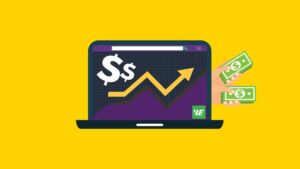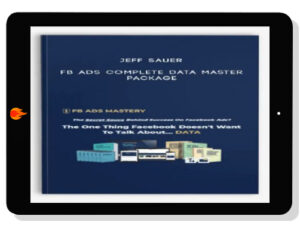Python is a relatively new programming language and, unlike R, it is a general-purpose programming language. File Size: 14.08 GB
The Data Science Course 2019: Complete Data Science Bootcamp
What you’ll learn
   The course provides the entire toolbox you need to become a data scientist
Fill up your resume with in demand data science skills: Statistical analysis, Python programming with NumPy, pandas, matplotlib, and Seaborn, Advanced statistical analysis, Tableau, Machine Learning with stats models and scikit-learn, Deep learning with TensorFlow
Impress interviewers by showing an understanding of the data science field
Learn how to pre-process data
Understand the mathematics behind Machine Learning (an absolute must which other courses don’t teach!)
Start coding in Python and learn how to use it for statistical analysis
Perform linear and logistic regressions in Python
Carry out cluster and factor analysis
Be able to create Machine Learning algorithms in Python, using NumPy, statsmodels and scikit-learn
Apply your skills to real-life business cases
Use state-of-the-art Deep Learning frameworks such as Google’s TensorFlowDevelop a business intuition while coding and solving tasks with big data
Unfold the power of deep neural networks
Improve Machine Learning algorithms by studying underfitting, overfitting, training, validation, n-fold cross validation, testing, and how hyperparameters could improve performance
Warm up your fingers as you will be eager to apply everything you have learned here to more and more real-life situations
Get immediately download The Data Science Course 2019: Complete Data Science Bootcamp
Course content
Expand all 471 lectures28:52:43
–Part 1: Introduction
19:20
A Practical Example: What You Will Learn in This Course
Preview
05:05
What Does the Course Cover
Preview
03:34
Download All Resources and Important FAQ
10:41
–The Field of Data Science – The Various Data Science Disciplines
31:11
Data Science and Business Buzzwords: Why are there so many?
Preview
05:21
Data Science and Business Buzzwords: Why are there so many?
1 question
What is the difference between Analysis and Analytics
03:50
What is the difference between Analysis and Analytics
1 question
Business Analytics, Data Analytics, and Data Science: An Introduction
Preview
08:26
Business Analytics, Data Analytics, and Data Science: An Introduction
3 questions
Continuing with BI, ML, and AI
09:31
Continuing with BI, ML, and AI
2 questions
A Breakdown of our Data Science Infographic
04:03
A Breakdown of our Data Science Infographic
1 question
–The Field of Data Science – Connecting the Data Science Disciplines
07:19
Applying Traditional Data, Big Data, BI, Traditional Data Science and ML
07:19
Applying Traditional Data, Big Data, BI, Traditional Data Science and ML
1 question
–The Field of Data Science – The Benefits of Each Discipline
04:44
The Reason behind these Disciplines
04:44
The Reason behind these Disciplines
1 question
–The Field of Data Science – Popular Data Science Techniques
53:34
Techniques for Working with Traditional Data
08:13
Techniques for Working with Traditional Data
1 question
Real Life Examples of Traditional Data
01:44
Techniques for Working with Big Data
04:26
Techniques for Working with Big Data
1 question
Real Life Examples of Big Data
01:32
Business Intelligence (BI) Techniques
06:45
Business Intelligence (BI) Techniques
4 questions
Real Life Examples of Business Intelligence (BI)
01:42
Techniques for Working with Traditional Methods
09:08
Techniques for Working with Traditional Methods
4 questions
Real Life Examples of Traditional Methods
02:45
Machine Learning (ML) Techniques
06:55
Machine Learning (ML) Techniques
2 questions
Types of Machine Learning
08:13
Types of Machine Learning
2 questions
Real Life Examples of Machine Learning (ML)
02:11
Real Life Examples of Machine Learning (ML)
5 questions
–The Field of Data Science – Popular Data Science Tools
05:51
Necessary Programming Languages and Software Used in Data Science
05:51
Necessary Programming Languages and Software Used in Data Science
4 questions
–The Field of Data Science – Careers in Data Science
03:29
Finding the Job – What to Expect and What to Look for
03:29
Finding the Job – What to Expect and What to Look for
1 question
–The Field of Data Science – Debunking Common Misconceptions
04:10
Debunking Common Misconceptions
04:10
Debunking Common Misconceptions
1 question
–Part 2: Probability
23:04
The Basic Probability Formula
07:09
The Basic Probability Formula
3 questions
Computing Expected Values
05:29
Computing Expected Values
3 questions
Frequency
05:00
Frequency
3 questions
Events and Their Complements
05:26
Events and Their Complements
3 questions
–Probability – Combinatorics
42:56
Fundamentals of Combinatorics
01:04
Fundamentals of Combinatorics
1 question
Permutations and How to Use Them
03:21
Permutations and How to Use Them
2 questions
Simple Operations with Factorials
03:35
Simple Operations with Factorials
3 questions
Solving Variations with Repetition
02:59
Solving Variations with Repetition
3 questions
Solving Variations without Repetition
03:48
Solving Variations without Repetition
3 questions
Solving Combinations
04:51
Solving Combinations
4 questions
Symmetry of Combinations
03:26
Symmetry of Combinations
1 question
Solving Combinations with Separate Sample Spaces
02:52
Solving Combinations with Separate Sample Spaces
1 question
Combinatorics in Real-Life: The Lottery
03:12
Combinatorics in Real-Life: The Lottery
1 question
A Recap of Combinatorics
02:55
A Practical Example of Combinatorics
10:53
–Probability – Bayesian Inference
54:38
Sets and Events
04:25
Sets and Events
3 questions
Ways Sets Can Interact
03:45
Ways Sets Can Interact
2 questions
Intersection of Sets
02:06
Intersection of Sets
3 questions
Union of Sets
04:51
Union of Sets
3 questions
Mutually Exclusive Sets
02:09
Mutually Exclusive Sets
4 questions
Dependence and Independence of Sets
03:01
Dependence and Independence of Sets
3 questions
The Conditional Probability Formula
04:16
The Conditional Probability Formula
3 questions
The Law of Total Probability
03:03
The Additive Rule
02:21
The Additive Rule
2 questions
The Multiplication Law
04:05
The Multiplication Law
2 questions
Bayes’ Law
05:44
Bayes’ Law
2 questions
A Practical Example of Bayesian Inference
14:52
–Probability – Distributions
01:17:12
Fundamentals of Probability Distributions
06:29
Fundamentals of Probability Distributions
3 questions
Types of Probability Distributions
07:32
Types of Probability Distributions
2 questions
Characteristics of Discrete Distributions
02:00
Characteristics of Discrete Distributions
2 questions
Discrete Distributions: The Uniform Distribution
02:13
Discrete Distributions: The Uniform Distribution
2 questions
Discrete Distributions: The Bernoulli Distribution
03:26
Discrete Distributions: The Bernoulli Distribution
1 question
Discrete Distributions: The Binomial Distribution
07:04
Discrete Distributions: The Binomial Distribution
1 question
Discrete Distributions: The Poisson Distribution
05:27
Discrete Distributions: The Poisson Distribution
1 question
Characteristics of Continuous Distributions
07:12
Characteristics of Continuous Distributions
1 question
Continuous Distributions: The Normal Distribution
04:08
Continuous Distributions: The Normal Distribution
1 question
Continuous Distributions: The Standard Normal Distribution
04:25
Continuous Distributions: The Standard Normal Distribution
1 question
Continuous Distributions: The Students’ T Distribution
02:29
Continuous Distributions: The Students’ T Distribution
1 question
Continuous Distributions: The Chi-Squared Distribution
02:22
Continuous Distributions: The Chi-Squared Distribution
1 question
Continuous Distributions: The Exponential Distribution
03:15
Continuous Distributions: The Exponential Distribution
1 question
Continuous Distributions: The Logistic Distribution
04:07
Continuous Distributions: The Logistic Distribution
1 question
A Practical Example of Probability Distributions
15:03
–Probability – Probability in Other Fields
18:51
Probability in Finance
07:46
Probability in Statistics
06:18
Probability in Data Science
04:47
–Part 3: Statistics
04:02
Population and Sample
04:02
Population and Sample
2 questions
–Statistics – Descriptive Statistics
48:11
Types of Data
04:33
Types of Data
2 questions
Levels of Measurement
03:43
Levels of Measurement
2 questions
Categorical Variables – Visualization Techniques
Preview
04:52
Categorical Variables – Visualization Techniques
1 question
Categorical Variables Exercise
00:03
Numerical Variables – Frequency Distribution Table
03:09
Numerical Variables – Frequency Distribution Table
1 question
Numerical Variables Exercise
00:03
The Histogram
02:14
The Histogram
1 question
Histogram Exercise
00:03
Cross Tables and Scatter Plots
04:44
Cross Tables and Scatter Plots
1 question
Cross Tables and Scatter Plots Exercise
00:03
Mean, median and mode
04:20
Mean, Median and Mode Exercise
00:03
Skewness
02:37
Skewness
1 question
Skewness Exercise
00:03
Variance
05:55
Variance Exercise
00:15
Standard Deviation and Coefficient of Variation
04:40
Standard Deviation
1 question
Standard Deviation and Coefficient of Variation Exercise
00:03
Covariance
03:23
Covariance
1 question
Covariance Exercise
00:03
Correlation Coefficient
03:17
Correlation
1 question
Correlation Coefficient Exercise
00:03
–Statistics – Practical Example: Descriptive Statistics
16:18
Practical Example: Descriptive Statistics
Preview
16:15
Practical Example: Descriptive Statistics Exercise
00:03
–Statistics – Inferential Statistics Fundamentals
21:53
Introduction
01:00
What is a Distribution
04:33
What is a Distribution
1 question
The Normal Distribution
03:54
The Normal Distribution
1 question
The Standard Normal Distribution
03:30
The Standard Normal Distribution
1 question
The Standard Normal Distribution Exercise
00:03
Central Limit Theorem
04:20
Central Limit Theorem
1 question
Standard error
01:26
Standard Error
1 question
Estimators and Estimates
03:07
Estimators and Estimates
1 question
–Statistics – Inferential Statistics: Confidence Intervals
44:25
What are Confidence Intervals?
02:41
What are Confidence Intervals?
1 question
Confidence Intervals; Population Variance Known; z-score
08:01
Confidence Intervals; Population Variance Known; z-score; Exercise
00:03
Confidence Interval Clarifications
04:38
Student’s T Distribution
03:22
Student’s T Distribution
1 question
Confidence Intervals; Population Variance Unknown; t-score
04:36
Confidence Intervals; Population Variance Unknown; t-score; Exercise
00:03
Margin of Error
04:52
Margin of Error
1 question
Confidence intervals. Two means. Dependent samples
06:04
Confidence intervals. Two means. Dependent samples Exercise
00:03
Confidence intervals. Two means. Independent samples (Part 1)
04:31
Confidence intervals. Two means. Independent samples (Part 1) Exercise
00:03
Confidence intervals. Two means. Independent samples (Part 2)
03:57
Confidence intervals. Two means. Independent samples (Part 2) Exercise
00:03
Confidence intervals. Two means. Independent samples (Part 3)
01:27
–Statistics – Practical Example: Inferential Statistics
10:08
Practical Example: Inferential Statistics
10:05
Practical Example: Inferential Statistics Exercise
00:03
–Statistics – Hypothesis Testing
48:24
Null vs Alternative Hypothesis
Preview
05:51
Further Reading on Null and Alternative Hypothesis
01:16
Null vs Alternative Hypothesis
2 questions
Rejection Region and Significance Level
07:05
Rejection Region and Significance Level
2 questions
Type I Error and Type II Error
04:14
Type I Error and Type II Error
4 questions
Test for the Mean. Population Variance Known
06:34
Test for the Mean. Population Variance Known Exercise
00:03
p-value
04:13
p-value
4 questions
Test for the Mean. Population Variance Unknown
04:48
Test for the Mean. Population Variance Unknown Exercise
00:03
Test for the Mean. Dependent Samples
05:18
Test for the Mean. Dependent Samples Exercise
00:03
Test for the mean. Independent samples (Part 1)
04:22
Test for the mean. Independent samples (Part 1). Exercise
00:03
Test for the mean. Independent samples (Part 2)
04:26
Test for the mean. Independent samples (Part 2)
1 question
Test for the mean. Independent samples (Part 2) Exercise
00:03
–Statistics – Practical Example: Hypothesis Testing
07:19
Practical Example: Hypothesis Testing
07:16
Practical Example: Hypothesis Testing Exercise
00:03
–Part 4: Introduction to Python
32:49
Introduction to Programming
05:04
Introduction to Programming
2 questions
Why Python?
05:11
Why Python?
2 questions
Why Jupyter?
03:29
Why Jupyter?
2 questions
Installing Python and Jupyter
06:49
Understanding Jupyter’s Interface – the Notebook Dashboard
03:15
Prerequisites for Coding in the Jupyter Notebooks
06:15
Jupyter’s Interface
3 questions
Python 2 vs Python 3
02:46
–Python – Variables and Data Types
19:17
Variables
04:52
Variables
1 question
Numbers and Boolean Values in Python
03:05
Numbers and Boolean Values in Python
1 question
Python Strings
11:20
Python Strings
3 questions
–Python – Basic Python Syntax
15:13
Using Arithmetic Operators in Python
03:23
Using Arithmetic Operators in Python
1 question
The Double Equality Sign
01:33
The Double Equality Sign
1 question
How to Reassign Values
01:08
How to Reassign Values
1 question
Add Comments
03:20
Add Comments
1 question
Understanding Line Continuation
00:49
Get immediately download The Data Science Course 2019: Complete Data Science Bootcamp
Indexing Elements
01:18
Indexing Elements
1 question
Structuring with Indentation
03:42
Structuring with Indentation
1 question
–Python – Other Python Operators
07:45
Comparison Operators
02:10
Comparison Operators
2 questions
Logical and Identity Operators
05:35
Logical and Identity Operators
2 questions
–Python – Conditional Statements
27:44
The IF Statement
06:13
The IF Statement
1 question
The ELSE Statement
05:37
The ELIF Statement
11:16
A Note on Boolean Values
04:38
A Note on Boolean Values
1 question
–Python – Python Functions
29:26
Defining a Function in Python
04:20
How to Create a Function with a Parameter
07:58
Defining a Function in Python – Part II
05:29
How to Use a Function within a Function
01:49
Conditional Statements and Functions
03:06
Functions Containing a Few Arguments
02:48
Built-in Functions in Python
03:56
Python Functions
2 questions
–Python – Sequences
34:49
Lists
08:18
Lists
1 question
Using Methods
06:54
Using Methods
1 question
List Slicing
04:30
Tuples
06:40
Dictionaries
08:27
Dictionaries
1 question
–Python – Iterations
32:30
For Loops
Preview
05:40
For Loops
1 question
While Loops and Incrementing
05:10
Lists with the range() Function
06:22
Lists with the range() Function
1 question
Conditional Statements and Loops
06:30
Conditional Statements, Functions, and Loops
02:27
How to Iterate over Dictionaries
06:21
–Python – Advanced Python Tools
12:56
Object Oriented Programming
05:00
Object Oriented Programming
2 questions
Modules and Packages
01:05
Modules and Packages
2 questions
What is the Standard Library?
02:47
What is the Standard Library?
1 question
Importing Modules in Python
04:04
Importing Modules in Python
2 questions
–Part 5: Advanced Statistical Methods in Python
01:27
Introduction to Regression Analysis
01:27
Introduction to Regression Analysis
1 question
–Advanced Statistical Methods – Linear regression with StatsModels
40:55
The Linear Regression Model
05:50
The Linear Regression Model
2 questions
Correlation vs Regression
01:43
Correlation vs Regression
1 question
Geometrical Representation of the Linear Regression Model
01:25
Geometrical Representation of the Linear Regression Model
1 question
Python Packages Installation
04:39
First Regression in Python
07:11
First Regression in Python Exercise
00:39
Using Seaborn for Graphs
01:21
How to Interpret the Regression Table
05:47
How to Interpret the Regression Table
3 questions
Decomposition of Variability
03:37
Decomposition of Variability
1 question
What is the OLS?
03:13
What is the OLS
1 question
R-Squared
05:30
R-Squared
2 questions
–Advanced Statistical Methods – Multiple Linear Regression with StatsModels
42:18
Multiple Linear Regression
02:55
Multiple Linear Regression
1 question
Adjusted R-Squared
06:00
Adjusted R-Squared
3 questions
Multiple Linear Regression Exercise
00:03
Test for Significance of the Model (F-Test)
02:01
OLS Assumptions
02:21
OLS Assumptions
1 question
A1: Linearity
01:50
A1: Linearity
2 questions
A2: No Endogeneity
04:09
A2: No Endogeneity
1 question
A3: Normality and Homoscedasticity
05:47
A4: No Autocorrelation
03:31
A4: No autocorrelation
2 questions
A5: No Multicollinearity
03:26
A5: No Multicollinearity
1 question
Dealing with Categorical Data – Dummy Variables
06:43
Dealing with Categorical Data – Dummy Variables
00:03
Making Predictions with the Linear Regression
03:29
–Advanced Statistical Methods – Linear Regression with sklearn
54:27
What is sklearn and How is it Different from Other Packages
02:14
How are Going to Approach this Section?
01:56
Simple Linear Regression with sklearn
Preview
05:38
Simple Linear Regression with sklearn – A StatsModels-like Summary Table
Preview
04:49
A Note on Normalization
00:09
Simple Linear Regression with sklearn – Exercise
00:03
Multiple Linear Regression with sklearn
03:10
Calculating the Adjusted R-Squared in sklearn
04:45
Calculating the Adjusted R-Squared in sklearn – Exercise
00:03
Feature Selection (F-regression)
04:41
A Note on Calculation of P-values with sklearn
00:13
Creating a Summary Table with p-values
02:10
Multiple Linear Regression – Exercise
00:03
Feature Scaling (Standardization)
05:38
Feature Selection through Standardization of Weights
05:22
Predicting with the Standardized Coefficients
03:53
Feature Scaling (Standardization) – Exercise
00:03
Underfitting and Overfitting
02:42
Train – Test Split Explained
06:54
–Advanced Statistical Methods – Practical Example: Linear Regression
37:58
Practical Example: Linear Regression (Part 1)
11:59
Practical Example: Linear Regression (Part 2)
06:12
A Note on Multicollinearity
00:14
Practical Example: Linear Regression (Part 3)
03:15
Dummies and Variance Inflation Factor – Exercise
00:03
Practical Example: Linear Regression (Part 4)
08:10
Dummy Variables – Exercise
00:14
Practical Example: Linear Regression (Part 5)
07:34
Linear Regression – Exercise
00:16
–Advanced Statistical Methods – Logistic Regression
40:49
Introduction to Logistic Regression
01:19
A Simple Example in Python
04:42
Logistic vs Logit Function
04:00
Building a Logistic Regression
02:48
Building a Logistic Regression – Exercise
00:03
An Invaluable Coding Tip
02:26
Understanding Logistic Regression Tables
04:06
Understanding Logistic Regression Tables – Exercise
00:03
What do the Odds Actually Mean
04:30
Binary Predictors in a Logistic Regression
04:32
Binary Predictors in a Logistic Regression – Exercise
00:03
Calculating the Accuracy of the Model
03:21
Calculating the Accuracy of the Model
00:03
Underfitting and Overfitting
03:43
Testing the Model
05:05
Testing the Model – Exercise
00:03
–Advanced Statistical Methods – Cluster Analysis
14:03
Introduction to Cluster Analysis
03:41
Some Examples of Clusters
04:31
Difference between Classification and Clustering
02:32
Math Prerequisites
03:19
–Advanced Statistical Methods – K-Means Clustering
49:01
K-Means Clustering
04:41
A Simple Example of Clustering
07:48
A Simple Example of Clustering – Exercise
00:03
Clustering Categorical Data
02:50
Clustering Categorical Data – Exercise
00:03
How to Choose the Number of Clusters
06:11
How to Choose the Number of Clusters – Exercise
00:03
Pros and Cons of K-Means Clustering
03:23
To Standardize or not to Standardize
04:32
Relationship between Clustering and Regression
01:31
Market Segmentation with Cluster Analysis (Part 1)
06:03
Market Segmentation with Cluster Analysis (Part 2)
06:58
How is Clustering Useful?
04:47
EXERCISE: Species Segmentation with Cluster Analysis (Part 1)
00:03
EXERCISE: Species Segmentation with Cluster Analysis (Part 2)
00:03
–Advanced Statistical Methods – Other Types of Clustering
13:34
Types of Clustering
03:39
Dendrogram
05:21
Heatmaps
Preview
04:34
–Part 6: Mathematics
51:01
What is a matrix?
03:37
What is a Matrix?
6 questions
Scalars and Vectors
02:58
Scalars and Vectors
5 questions
Linear Algebra and Geometry
03:06
Linear Algebra and Geometry
3 questions
Arrays in Python – A Convenient Way To Represent Matrices
05:09
What is a Tensor?
03:00
What is a Tensor?
2 questions
Addition and Subtraction of Matrices
03:36
Addition and Subtraction of Matrices
3 questions
Errors when Adding Matrices
02:01
Transpose of a Matrix
05:13
Dot Product
03:48
Dot Product of Matrices
08:23
Why is Linear Algebra Useful?
10:10
–Part 7: Deep Learning
03:07
What to Expect from this Part?
03:07
What is Machine Learning
4 questions
–Deep Learning – Introduction to Neural Networks
42:38
Introduction to Neural Networks
04:09
Introduction to Neural Networks
1 question
Training the Model
02:54
Training the Model
3 questions
Types of Machine Learning
03:43
Get immediately download The Data Science Course 2019: Complete Data Science Bootcamp
Types of Machine Learning
4 questions
The Linear Model (Linear Algebraic Version)
03:08
The Linear Model
2 questions
The Linear Model with Multiple Inputs
02:25
The Linear Model with Multiple Inputs
2 questions
The Linear model with Multiple Inputs and Multiple Outputs
04:25
The Linear model with Multiple Inputs and Multiple Outputs
3 questions
Graphical Representation of Simple Neural Networks
01:47
Graphical Representation of Simple Neural Networks
1 question
What is the Objective Function?
01:27
What is the Objective Function?
2 questions
Common Objective Functions: L2-norm Loss
02:04
Common Objective Functions: L2-norm Loss
3 questions
Common Objective Functions: Cross-Entropy Loss
03:55
Common Objective Functions: Cross-Entropy Loss
4 questions
Optimization Algorithm: 1-Parameter Gradient Descent
06:33
Optimization Algorithm: 1-Parameter Gradient Descent
4 questions
Optimization Algorithm: n-Parameter Gradient Descent
06:08
Optimization Algorithm: n-Parameter Gradient Descent
3 questions
–Deep Learning – How to Build a Neural Network from Scratch with NumPy
20:35
Basic NN Example (Part 1)
03:06
Basic NN Example (Part 2)
04:58
Basic NN Example (Part 3)
03:25
Basic NN Example (Part 4)
08:15
Basic NN Example Exercises
00:51
–Deep Learning – TensorFlow 2.0: Introduction
28:10
How to Install TensorFlow 2.0
05:02
TensorFlow Outline and Comparison with Other Libraries
03:28
TensorFlow 1 vs TensorFlow 2
02:33
A Note on TensorFlow 2 Syntax
00:58
Types of File Formats Supporting TensorFlow
02:34
Outlining the Model with TensorFlow 2
05:48
Interpreting the Result and Extracting the Weights and Bias
04:09
Customizing a TensorFlow 2 Model
02:51
Basic NN with TensorFlow: Exercises
00:47
–Deep Learning – Digging Deeper into NNs: Introducing Deep Neural Networks
25:44
What is a Layer?
01:53
What is a Deep Net?
02:18
Digging into a Deep Net
04:58
Non-Linearities and their Purpose
02:59
Activation Functions
03:37
Activation Functions: Softmax Activation
03:24
Backpropagation
03:12
Backpropagation picture
03:02
Backpropagation – A Peek into the Mathematics of Optimization
00:21
–Deep Learning – Overfitting
19:36
What is Overfitting?
03:51
Underfitting and Overfitting for Classification
01:52
What is Validation?
03:22
Training, Validation, and Test Datasets
02:30
N-Fold Cross Validation
03:07
Early Stopping or When to Stop Training
04:54
–Deep Learning – Initialization
08:04
What is Initialization?
02:32
Types of Simple Initializations
02:47
State-of-the-Art Method – (Xavier) Glorot Initialization
02:45
–Deep Learning – Digging into Gradient Descent and Learning Rate Schedules
20:40
Stochastic Gradient Descent
03:24
Problems with Gradient Descent
02:02
Momentum
02:30
Learning Rate Schedules, or How to Choose the Optimal Learning Rate
04:25
Learning Rate Schedules Visualized
01:32
Adaptive Learning Rate Schedules (AdaGrad and RMSprop )
04:08
Adam (Adaptive Moment Estimation)
02:39
–Deep Learning – Preprocessing
14:33
Preprocessing Introduction
02:51
Types of Basic Preprocessing
01:17
Standardization
04:31
Preprocessing Categorical Data
02:15
Binary and One-Hot Encoding
03:39
–Deep Learning – Classifying on the MNIST Dataset
36:34
MNIST: The Dataset
02:25
MNIST: How to Tackle the MNIST
02:44
MNIST: Importing the Relevant Packages and Loading the Data
02:11
MNIST: Preprocess the Data – Create a Validation Set and Scale It
04:43
MNIST: Preprocess the Data – Scale the Test Data – Exercise
00:03
MNIST: Preprocess the Data – Shuffle and Batch
06:30
MNIST: Preprocess the Data – Shuffle and Batch – Exercise
00:03
MNIST: Outline the Model
04:54
MNIST: Select the Loss and the Optimizer
02:05
MNIST: Learning
05:38
MNIST – Exercises
01:21
MNIST: Testing the Model
03:56
–Deep Learning – Business Case Example
39:19
Business Case: Exploring the Dataset and Identifying Predictors
07:54
Business Case: Outlining the Solution
01:31
Business Case: Balancing the Dataset
03:39
Business Case: Preprocessing the Data
11:32
Business Case: Preprocessing the Data – Exercise
00:12
Business Case: Load the Preprocessed Data
03:23
Business Case: Load the Preprocessed Data – Exercise
00:03
Business Case: Learning and Interpreting the Result
04:15
Business Case: Setting an Early Stopping Mechanism
05:01
Setting an Early Stopping Mechanism – Exercise
00:08
Business Case: Testing the Model
01:23
Business Case: Final Exercise
00:16
–Deep Learning – Conclusion
17:26
Summary on What You’ve Learned
03:41
What’s Further out there in terms of Machine Learning
01:47
DeepMind and Deep Learning
00:21
An overview of CNNs
04:55
An Overview of RNNs
02:50
An Overview of non-NN Approaches
03:52
–Appendix: Deep Learning – TensorFlow 1: Introduction
28:52
READ ME!!!!
00:21
How to Install TensorFlow 1
02:20
A Note on Installing Packages in Anaconda
01:14
TensorFlow Intro
03:46
Actual Introduction to TensorFlow
01:40
Types of File Formats, supporting Tensors
02:38
Basic NN Example with TF: Inputs, Outputs, Targets, Weights, Biases
06:05
Basic NN Example with TF: Loss Function and Gradient Descent
03:41
Basic NN Example with TF: Model Output
06:05
Basic NN Example with TF Exercises
01:01
–Appendix: Deep Learning – TensorFlow 1: Classifying on the MNIST Dataset
39:31
MNIST: Wha








